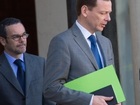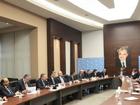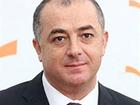A leading member of the Arab Democratic Party, Rifaat Eid, stressed on Wednesday that the party has no intention to escalate the situation in Lebanon, pointing out that political settlements are always held “on our blood.”
“There is no political interest for any Lebanese side to escalate the security situation,” Eid said in comments published in the pan-Arab daily Asharq al-Awsat.
 Full Story
Full Story
French President Francois Hollande and Foreign Minister Laurent Fabius decided to appoint one of the Elysee Palace advisers as ambassador to Beirut, pan-Arab daily al-Hayat reported on Wednesday.
Informed sources told al-Hayat that the diplomat is Emmanuel Bonne, Hollande's adviser for North Africa, the Middle East and the United Nations.
 Full Story
Full Story
Lebanese Forces chief Samir Geagea described the presidential deadlock as a “misery,” laying blame on Hizbullah-backer Iran and saying no solution was currently lying on the horizon .
“More than any other time Iran does not want a president for Lebanon unless he belonged to its camp,” Geagea told journalists who visited him in Maarab on Tuesday.
 Full Story
Full Story
The members of the committee tasked with following up on the dialogue between Bkirki and Hizbullah met again in Beirut's southern suburbs – Dahiyeh to follow up their latest meeting in February.
According to al-Joumhouria newspaper published on Wednesday, talks focused on the importance of electing a new head of state and fears of the ongoing vacuum.
 Full Story
Full Story
Al-Mustaqbal parliamentary bloc accused Hizbullah on Tuesday of seeking to “impose its presidential candidate as a sole nominee,” blaming it for the ongoing presidential vacuum.
Criticizing remarks by Hizbullah politburo chief Sayyed Ibrahim Amin al-Sayyed, the bloc said his statements “clearly show who is obstructing the election of a new president.”
 Full Story
Full Story
Residents of the Syrian side of the border town of Hikr al-Daheri held a funeral Tuesday for Bader Eid -- a brother of Arab Democratic Party leader Ali Eid – who was shot dead Monday in the Akkar town of al-Kuweikhat.
TV footage showed Ali Eid and his son Rifaat -- both wanted by Lebanese authorities on terror offenses -- participating in the funeral procession.
 Full Story
Full Story
Israeli Prime Minister Benjamin Netanyahu did not forget to blast Hizbullah during his anti-Iran speech before the U.S. Congress on Tuesday, describing the Lebanese party and Tehran as a real threat to Israel's survival.
“For those who believe that Iran threatens the Jewish state, but not the Jewish people, listen to (Sayyed) Hassan Nasrallah, the leader of Hizbullah, Iran's chief terrorist proxy. He said: If all the Jews gather in Israel, it will save us the trouble of chasing them down around the world,” Netanyahu said.
 Full Story
Full Story
The Change and Reform parliamentary bloc reiterated Tuesday its rejection of any attempt to change the mechanism through which the cabinet is taking decisions in the absence of a president, noting that the objection of one minister -- or even a political component -- should not paralyze the work of the council of ministers.
“The cabinet cannot continue its work normally in the absence of a president,” Education Minister Elias Bou Saab said after the bloc's weekly meeting in Rabieh.
 Full Story
Full Story
The Kataeb Party renewed on Tuesday its demand for the election of a new president, saying that a new head of state will restore normalcy to state institutions.
It said in a statement after its weekly politburo meeting: “Complete internal stability cannot be achieved without a president, who safeguards the national pact and constitution.”
 Full Story
Full Story
Authorities have denied a French expert on jihadists entry to Lebanon and accused him of links to extremist groups, diplomatic and security sources said Tuesday.
Romain Caillet, a researcher with the French Institute for the Near East, is a specialist on jihadist movements including the Islamic State group and had been based in Lebanon for five years.
 Full Story
Full Story



